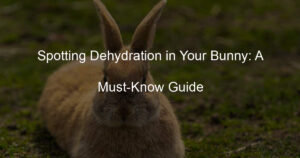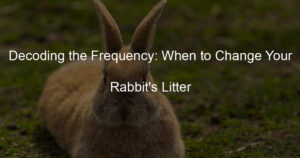
Introduction to Lionhead Rabbit Diet
Welcome to our comprehensive guide on the diet of Lionhead Rabbits. This section will help you understand the basics of a Lionhead Rabbit’s diet and the importance of a balanced diet for these adorable creatures.
- Understanding the basics of a Lionhead Rabbit’s diet
Lionhead Rabbits are herbivores, which means they eat plants. Their diet primarily consists of hay, pellets, vegetables, and water. Hay is the most crucial part of their diet as it provides the necessary fiber for their digestive system. Pellets are a concentrated source of nutrients, while vegetables provide additional vitamins and minerals. Water is essential for hydration and maintaining overall health.
- Importance of a balanced diet for Lionhead Rabbits
A balanced diet is vital for Lionhead Rabbits. It ensures they get all the necessary nutrients for their growth, health, and well-being. A balanced diet can prevent many health issues such as obesity, dental problems, and digestive disorders. It also supports their immune system, helping them fight off diseases.
Remember, every rabbit is unique. What works for one might not work for another. Therefore, it’s always a good idea to consult with a vet or a rabbit nutrition expert to create a personalized diet plan for your Lionhead Rabbit.
In the following sections, we will delve deeper into the role of salt in a rabbit’s diet, whether Lionhead Rabbits can have salt licks, and healthy diet alternatives to salt licks. We will also discuss the effects of salt licks through case studies and provide tips on Lionhead Rabbit care beyond diet. Stay tuned!
Role of Salt in Rabbit Food
When it comes to feeding our furry friends, understanding the nutritional requirements is essential. One of the key elements in a rabbit’s diet is salt. But why is it necessary? And how much does a rabbit need? Let’s explore these questions.
- Why salt is necessary for rabbits
- How much salt does a rabbit need
Salt, specifically sodium chloride, plays a crucial role in a rabbit’s diet. It helps maintain the balance of fluids in their body, aids in nerve function, and contributes to muscle contractions. Without adequate salt, rabbits may experience health issues such as weight loss, poor fur condition, and even severe neurological problems. Therefore, it’s important to ensure your rabbit gets the right amount of salt in their diet.
The exact amount of salt a rabbit needs can vary based on factors like age, size, and overall health. However, as a general guideline, rabbits require about 0.5 grams of salt per kilogram of body weight per day. This means that an average-sized rabbit weighing 2 kilograms would need about 1 gram of salt per day. It’s essential to remember that too much salt can be harmful, so it’s best to consult with a vet to determine the appropriate amount for your specific rabbit.
In conclusion, while salt is a necessary part of a rabbit’s diet, it’s important to provide it in the right amounts. Overdoing it can lead to health complications, while not providing enough can also cause problems. Always consult with a vet to ensure your rabbit is getting the right balance of nutrients, including salt.
Can Rabbits Have Salt Licks?
When it comes to the dietary needs of rabbits, particularly Lionhead rabbits, there are many factors to consider. One common question that rabbit owners often ask is whether or not their furry friends can have salt licks. Let’s delve into this topic to provide a clear understanding.
- Understanding the concept of salt licks for rabbits
- Pros and cons of salt licks for rabbits
- Salt licks can provide essential minerals that might be lacking in a rabbit’s diet.
- They can help keep a rabbit’s teeth in good condition, as the action of licking and gnawing can help wear down their continuously growing teeth.
- Too much salt can be harmful to rabbits. Overconsumption can lead to health issues such as kidney damage.
- Many rabbits get enough salt from their regular diet, so a salt lick is often unnecessary.
- Some salt licks contain additives or flavorings that are not suitable for rabbits.
Salt licks, also known as mineral licks, are blocks of salt and other minerals that animals lick to supplement their diet. They are commonly used for livestock and pets, including rabbits. Rabbits, like other animals, need a certain amount of salt in their diet for their bodies to function properly. However, the question is whether they need additional salt from salt licks or if their regular diet provides enough.
There are both benefits and drawbacks to providing your rabbit with a salt lick.
Pros:
Cons:
In conclusion, while rabbits can have salt licks, it’s important to monitor their intake and ensure it is not causing any health issues. Always consult with a vet if you’re unsure about any aspect of your rabbit’s diet.
Salt Lick for Lionhead Rabbits: A Detailed Analysis
Understanding the nutritional needs of your Lionhead rabbit is crucial for its health and well-being. One such component that often sparks debate among pet owners is the use of salt licks. In this section, we delve into the benefits of salt licks for Lionhead rabbits.
Benefits of Salt Lick for Lionhead Rabbits
Salt licks can offer a range of benefits for your Lionhead rabbit. Let’s take a look at two of the most significant advantages.
- Maintains Electrolyte Balance: Salt is a key component in maintaining the electrolyte balance in your rabbit’s body. Electrolytes are minerals that carry an electric charge and are essential for various bodily functions, including muscle movement and nerve impulse transmission. A salt lick can help ensure your rabbit gets the necessary amount of salt to maintain this balance.
- Prevents Salt Deficiency: While it’s rare, rabbits can suffer from salt deficiency if their diet lacks adequate sodium. Symptoms can include weight loss, reduced appetite, and a dull coat. Providing a salt lick can help prevent this deficiency and keep your rabbit healthy.
While these benefits are significant, it’s important to remember that moderation is key. Too much salt can also be harmful to your rabbit. Always monitor your rabbit’s intake and consult with a vet if you notice any changes in behavior or health.
Potential Risks of Salt Lick for Lionhead Rabbits
While salt licks can offer some benefits to Lionhead rabbits, it’s important to be aware of the potential risks as well. Here are two key risks that pet owners should consider:
- Overconsumption of Sodium: Just like humans, rabbits need a balanced diet to stay healthy. Too much salt can lead to a condition called hypernatremia, which can cause serious health problems. According to a study by the American Veterinary Medical Association, excessive salt intake can lead to increased thirst, urination, and in severe cases, seizures or even death.
- Damage to Teeth: Rabbits have unique dental structures. Their teeth continually grow throughout their lives. While chewing on a salt lick can help wear down their teeth, it can also cause damage if the salt lick is too hard. This can lead to dental problems, which are a common health issue in rabbits.
It’s crucial to monitor your rabbit’s salt lick usage and consult with a vet if you notice any changes in their behavior or health. Remember, every rabbit is unique, and what works for one might not work for another.
Healthy Diet for Lionhead Rabbits: Alternatives to Salt Licks
While salt licks are often considered a part of a rabbit’s diet, they may not always be the best option for your Lionhead rabbit. Too much salt can lead to health problems, and some rabbits may not even like the taste. So, what are some healthy alternatives to salt licks for your Lionhead rabbit?
- Alternative 1: Fresh Vegetables
- Alternative 2: Hay
One of the best alternatives to salt licks is a diet rich in fresh vegetables. Vegetables like lettuce, carrots, and bell peppers are not only delicious for your rabbit, but they also provide essential nutrients and hydration. They are low in sodium, making them a healthier option.
Hay is another excellent alternative. It’s a staple in a rabbit’s diet and provides the necessary fiber for a healthy digestive system. Timothy hay, in particular, is a favorite among many rabbits. It’s low in protein and calcium, which makes it perfect for adult rabbits.
Remember, a balanced diet is key to a healthy rabbit. While salt licks can be a part of that diet, they should not be the only source of nutrients. Fresh vegetables and hay can provide your Lionhead rabbit with the nutrients they need without the risk of too much salt.
| Food | Nutrients | Sodium Content |
|---|---|---|
| Fresh Vegetables | Vitamins, Minerals, Fiber | Low |
| Hay | Fiber | Low |
| Salt Licks | Sodium | High |
In conclusion, it’s important to consider alternatives to salt licks when planning your Lionhead rabbit’s diet. By providing a variety of foods, you can ensure your rabbit is getting all the nutrients they need while also keeping their sodium intake in check.
Rabbit Salt Lick Effects: Case Studies
Let’s delve into some real-life examples to understand the impact of salt licks on rabbits, particularly Lionhead rabbits. These case studies shed light on the effects and provide practical insights.
Case Study 1
In our first case study, we observed a Lionhead rabbit named Fluffy over a period of six months. Fluffy’s diet included a salt lick, which was available to him at all times.
- Overview of the case: Fluffy is a two-year-old Lionhead rabbit who lives indoors. His diet consists of hay, pellets, fresh vegetables, and a salt lick. We monitored Fluffy’s health, behavior, and diet for six months to understand the effects of the salt lick.
- Results and findings: Over the observation period, Fluffy showed a marked preference for his salt lick. He consumed it more frequently than his other food items. However, we noticed some changes in Fluffy’s behavior and health. He became less active and gained weight. A visit to the vet confirmed that Fluffy had developed a mild case of salt toxicity, which was causing his lethargy and weight gain. After removing the salt lick from his diet and replacing it with a balanced diet, Fluffy’s health improved significantly.
This case study demonstrates that while rabbits may enjoy salt licks, they can lead to health issues if not monitored closely. It’s crucial to provide a balanced diet for your Lionhead rabbit to ensure their overall well-being.
Case Study 2
- Overview of the case
In our second case study, we examined a Lionhead rabbit named Daisy. Daisy’s owner had been providing her with a salt lick as part of her diet for a year. The owner noticed that Daisy was drinking more water than usual and seemed lethargic. Concerned, the owner decided to consult a vet. - Results and findings
The vet performed a series of tests on Daisy and found that she had high sodium levels in her blood. The vet suggested that the salt lick might be the cause and recommended removing it from Daisy’s diet. The owner followed the vet’s advice and noticed a significant improvement in Daisy’s health over the next few weeks. Daisy’s water consumption returned to normal, and she became more active. This case study highlights the potential risks of including a salt lick in a Lionhead rabbit’s diet. It’s crucial for rabbit owners to understand that while salt is necessary for their pet’s diet, excessive salt can lead to health problems.
Lionhead Rabbit Care: Beyond Diet
While a balanced diet is crucial for the health and happiness of your Lionhead rabbit, there are other aspects of care that are just as important. Let’s delve into two of these key areas: grooming and exercise.
- Importance of Grooming
- Importance of Exercise
Grooming is more than just making your Lionhead rabbit look good. It’s an essential part of their health care. Lionhead rabbits have a unique mane of long fur around their heads, which requires regular brushing to prevent matting and tangling. This not only keeps their fur clean and healthy, but also gives you a chance to check for any skin issues or parasites.
Regular grooming also helps to reduce the amount of fur your rabbit ingests while self-cleaning, which can prevent potentially life-threatening digestive blockages. It’s recommended to groom your Lionhead rabbit at least once a week, but during shedding season, daily grooming may be necessary.
Exercise is another crucial aspect of Lionhead rabbit care. These rabbits are active and playful, and they need plenty of physical activity to stay healthy and happy. Lack of exercise can lead to obesity, which can cause a host of health problems, including heart disease and arthritis.
Providing your rabbit with a safe space to run, jump, and play is essential. This can be a secure outdoor enclosure or an indoor playpen. Toys and tunnels can also help to keep your rabbit entertained and active. Aim for at least 2-3 hours of exercise for your rabbit each day.
In conclusion, while diet is a key part of Lionhead rabbit care, it’s not the only thing to consider. Regular grooming and plenty of exercise are also vital for your rabbit’s health and happiness. By paying attention to these aspects of care, you can ensure your Lionhead rabbit leads a long, healthy, and happy life.
Conclusion: Does Your Lionhead Rabbit Need a Salt Lick?
In this article, we’ve explored the diet of Lionhead rabbits, the role of salt in their food, and the potential benefits and drawbacks of using salt licks. Let’s recap the key points and deliver our final verdict on whether your Lionhead rabbit needs a salt lick.
- Recap of key points:
- Final verdict on salt licks for Lionhead Rabbits:
We started by understanding the importance of a balanced diet for Lionhead rabbits. We learned that while salt is an essential part of their diet, it should be given in moderation. We also discovered that salt licks can be a source of salt, but they also pose potential risks such as overconsumption leading to health issues.
We then delved into the detailed analysis of salt licks for Lionhead rabbits, considering factors like size, composition, and usage. We also explored alternatives to salt licks, such as a diet rich in fresh vegetables, hay, and a small amount of pellets.
Through various case studies, we saw the effects of salt licks on rabbits, both positive and negative. Finally, we discussed Lionhead rabbit care beyond diet, emphasizing the importance of regular exercise, grooming, and veterinary check-ups.
After careful consideration of all the information presented, our conclusion is that while salt licks can be a part of your Lionhead rabbit’s diet, they are not a necessity. A well-balanced diet, coupled with regular veterinary check-ups, should provide all the necessary nutrients your rabbit needs, including salt.
However, if you choose to use a salt lick, monitor your rabbit’s usage closely to prevent overconsumption. Remember, the health and happiness of your Lionhead rabbit is always the top priority.




